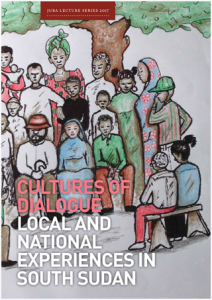Mounting peace agreements and numerous ceasefire violations have resulted in sustained international pressure on South Sudan’s leaders to end a civil war that has displaced some 4 million people and created a severe humanitarian crisis. In an effort to address the root causes of the crisis, South Sudan’s president, Salva Kiir Mayardit, announced his government’s intention to initiate a national dialogue process in December 2016. While dialogue should be welcomed as a necessary part of peacemaking and reconciliation, South Sudan’s national dialogue process has had its fair share of skepticism and even opposition.
The sixth annual Juba Lecture Series, held in November 2017, focused on themes of dialogue at both the local and national levels. The lectures—a collaboration with the Institute for Justice and Peace Studies at Catholic University of South Sudan, with support from the Australian Embassy in Addis Ababa—are designed to support local knowledge and provide a safe, open space for debate on key issues. This text forms a summary of some of the key debates that were held during the Juba Lecture Series 2017.




